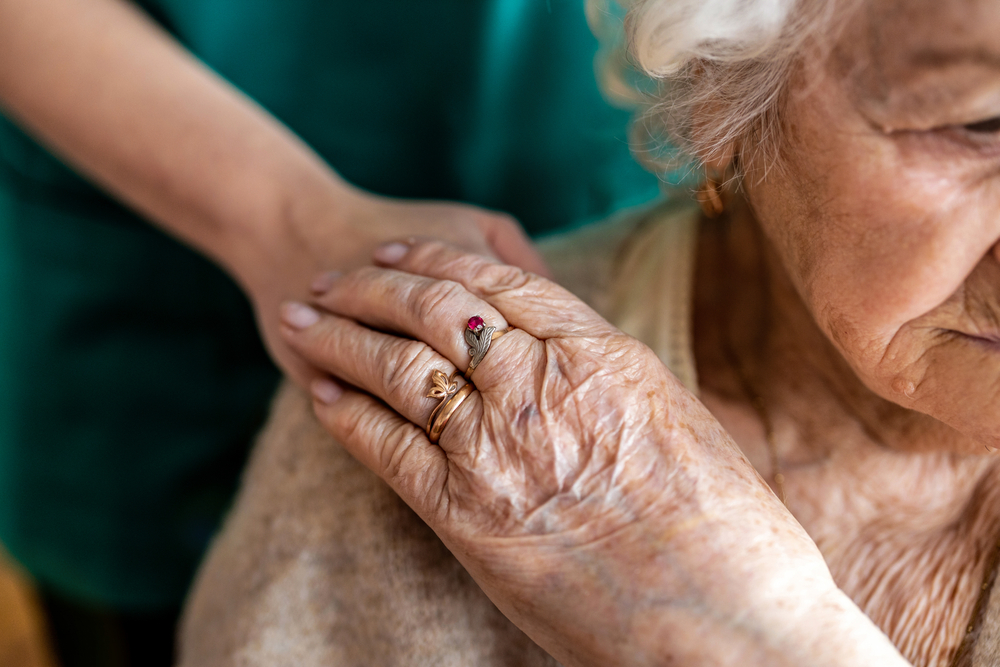In the early stages, those with dementia may need little or no help to continue thriving at home. They may be occasionally forgetful or require redirection, but they’re still able to care for themselves. As the disease progresses, however, it will be unsafe for your loved one to be left alone as they’ll require more and more help. This is when they’ll need 24-hour care.
Identifying when it’s time for 24-hour care can be tricky, especially if you interact with your loved one daily. It may be difficult to see subtle changes in their condition that indicate they require additional assistance. The guide below describes signs that a dementia client may require 24-hour support and outlines your options for care.
Remaining at home can help dementia clients thrive for longer. If your family member or loved one needs support to retain their independence, LightSpring Home Care can care for them 24 hours a day, 7 days a week. We’ll attend to your loved one’s hygiene, nutrition, mental health, and overall well-being. Contact us today to learn more about how we can support you and your loved one.
Signs Your Loved One Needs 24-Hour Care
Dementia symptoms are highly variable and can change from day to day, making it challenging to pinpoint when it’s time to engage in 24-hour care. However, there are some telltale signs to watch for when interacting with your family member. Below are a few of the most common ones.
Irritability and Aggression
Dementia can make it hard to remember how to perform simple tasks or recall short-term memories, causing confusion and frustration. These feelings can build up until a person lashes out, either verbally or physically. They may insult or attempt to strike those around them, which is a safety concern for everyone involved.
24-hour care can ease some of this frustration, as they’ll be able to have their needs met more easily. This can help them feel calmer and less prone to outbursts.
Disorientation and Confusion
The inability to form or recall short-term memories can make it tough to keep track of daily activities. Dementia clients may forget what they were doing in the middle of a task, forget where they are, or even struggle to remember what year it is. These things happen to everyone occasionally, but if this is habitual for your loved one with dementia, 24-hour care can help.
Difficulty With Daily Activities
If you notice a sudden or steady decline in your loved one’s hygiene, the state of their home, or fluctuations in their weight, it could indicate they’re having trouble with the activities of daily living. Dementia often affects coordination and makes it hard to complete tasks like vacuuming or brushing one’s hair. 24-hour dementia care services fill in the gaps by supporting your loved one with these tasks.
Forgetfulness Leading to Safety Risks
Someone with dementia may turn on the stove or oven and forget to turn it off, leave their doors unlocked at night, forget to take essential medications, or consume spoiled food because they forgot to check the expiration date. Each of these things puts their health and safety at risk.
Unsafe Home Environment
Individuals with dementia often begin to hoard items like magazines, newspapers, and other items in favor of housekeeping, like laundry and vacuuming. This can create a home full of health and safety hazards. Professional caregivers can help keep your loved one’s home clean, tidy, and free of tripping hazards and other safety concerns.
Options For 24-Hour Care
When it comes to dementia, everyone’s situation and needs are different. Medical professionals agree that it’s best if a person can age in place, and there are many home care options that can enable a person to do just that. However, if your loved one’s needs are too complex to remain at home, they can receive comprehensive care in a more suitable environment.
Below is a detailed list of the most common options for 24-hour dementia care.
Home Care
In most cases, 24-hour home care is the best option for those with dementia. This kind of memory care allows them to remain safe in familiar surroundings, which provides a sense of security. That security can help slow the progression of their symptoms, help keep them calm, and allow them to remain connected to friends, family, and their local community.
Non-Medical Home Care
Non-medical home care can be invaluable to those with dementia. Many of the issues that come with this disease involve an inability to care for themselves or their home. Non-medical caregivers are trained to help with a wide array of daily activities, including:
- Bathing, grooming, and dressing
- Light housekeeping
- Meal preparation
- Nutrition and hydration
- Transportation
Non-medical home care also includes medication reminders, safety supervision, and companionship for enrichment.
Medical Home Care
If your loved one has conditions other than dementia, they may need medical home care from an RN or LPN. Home care nurses can perform wound care, administer medications, change tracheostomy tubes, monitor vital signs, and much more.
It’s worth noting that having 24-hour medical home care may quickly become very expensive. To offset the cost, you can schedule just a few hours per day of medical care, and fill in the rest of the hours with non-medical care—which is traditionally much less expensive.
Nursing Home
Many nursing homes are equipped with staff and resources specifically designed to care for dementia clients. However, your loved one will be one of many clients being cared for by a team of nurses, so care won’t be as personalized as it would be at home. Additionally, moving to a new environment can be very stressful for dementia clients and can cause them to deteriorate more quickly.
Though a nursing home may be the best option for some families, most individuals with dementia thrive much better at home.
Family Caregiving
Some people are most comfortable caring for family members themselves. You may decide to move in with your loved one or have them move in with you. In either case, your loved one will be able to reside in a familiar environment with people they know. Being a family caregiver also provides peace of mind because you know your loved one is getting everything they need.
Additionally, family caregivers who are caring for dementia clients can apply for stipends or grants or work for a home care agency to obtain financial support while caring for their loved one.
What to Consider When Caring For a Loved One
When caring for a loved one yourself, it’s important to monitor your personal well-being. Caregiving is emotionally and physically taxing, and family caregivers are at a high risk for burnout. Burning out can cause you to become depressed and neglect your own needs.
To ensure you can be there for your loved one while maintaining your own health, it may be prudent to consider respite care. Professional caregivers can provide your loved one with supplemental care while you rest and recharge. That way, there’s never a gap in your loved one’s care, and you can look forward to regular breaks.
Get Compassionate 24-Hour Home Care From LightSpring Home Care
At LightSpring Home Care, our mission is to empower you to make the best possible choices for your loved one—including where they reside as their dementia progresses. With our 24-hour in-home care services, your loved one can remain safe at home, where they feel comfortable and secure.
Our 24-hour in-home memory care services include safety supervision, personal care, medication reminders, nutrition planning, and companion care. We’ll also help keep your loved one’s home tidy and free of safety hazards so they can navigate walkways more easily. Whether they need assistance buttoning a shirt, preparing a meal, or they just need a friendly ear, our caregivers can be there to meet their needs.
LightSpring Home Care’s caregivers are fully insured, and we carefully select the most qualified people to care for our clients. If you want your loved one to enjoy the benefits of aging in place, contact us today for more information.




